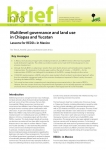
Multilevel governance arrangements face many challenges, not least sectorial cultures that promote (and perpetuate) particular visions of (and for) rural areas that are often incompatible. Different government ministries and commissions have different ‘ways of doing things’, rhythms and goals that do not always permit collaborations with other actors. As part of its Global Comparative Study on REDD+ (GCS-REDD+, http://www.cifor.org/gcs/), CIFOR initiated research on multilevel governance and REDD+ in Mexico in 2014 in a comparative project with four other
‘REDD+ countries’. This study looked critically at how landuse decisions are made and how these affect outcomes for diverse actors in two states in southern Mexico: Chiapas and Yucatan (see Map 1). It also examined the potential of new Low Emissions Development (LED) initiatives. In particular, it looked at questions of participation in decision-making processes and perceptions regarding the legitimacy and equity of these arrangements. The concept of multilevel governance is employed to analyze the degree of coordination between different levels and sectors for a common end. The study found many examples of efforts to improve multilevel governance around common problems, but also many obstacles and inertias that inhibited turning crosssector planning processes into practice.
Multilevel governance arrangements face many challenges, not least sectorial cultures that promote (and perpetuate) particular visions of (and for) rural areas that are often incompatible. Different government ministries and commissions have different ‘ways of doing things’, rhythms and goals that do not always permit collaborations with other actors. As part of its Global Comparative Study on REDD+ (GCS-REDD+, http://www.cifor.org/gcs/), CIFOR initiated research on multilevel governance and REDD+ in Mexico in 2014 in a comparative project with four other
‘REDD+ countries’. This study looked critically at how landuse decisions are made and how these affect outcomes for diverse actors in two states in southern Mexico: Chiapas and Yucatan (see Map 1). It also examined the potential of new Low Emissions Development (LED) initiatives. In particular, it looked at questions of participation in decision-making processes and perceptions regarding the legitimacy and equity of these arrangements. The concept of multilevel governance is employed to analyze the degree of coordination between different levels and sectors for a common end. The study found many examples of efforts to improve multilevel governance around common problems, but also many obstacles and inertias that inhibited turning crosssector planning processes into practice.
| Attachment | Size |
|---|---|
| 673.45 KB |